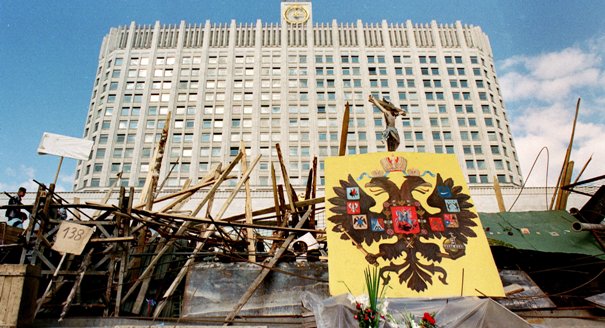With official interest in history currently very high in Russia, it was striking that last week's anniversary of the August 1991 coup against President Mikhail Gorbachev which sealed the fate of the Soviet Union and ushered in the present-day Russian Federation was virtually entirely ignored by the state media. As they used to say in former times, this was not accidental. Indeed, the omission constitutes an important signal.
Russia is rejecting the remnants of the liberal legacy of its anti-communist revolution and embracing the values of conservatism, above all, the hierarchical state. Seen from this angle, the 1991 "putsch," as it was branded then, was a last-ditch attempt to save the imperial state. Too late and too timid, as it turned out. Those who defeated the "putschists" launched Russia on the road to democracy, the market, and globalization, but in the process of doing so they gave away too much of the country's sovereignty. Thus, the "plotters" of 1991 are more likely now to be seen as heroes, and the victors look more like villains.
President Putin chuckled as he listened. A de facto monarchy is more practical. It also serves no useful purpose, from the Kremlin perspective, to encourage an intra-elite controversy between those who benefited from the 1991 upheaval and those who still feel betrayed. Rather, Putin has been consistently seeking historical reconciliation within society and an elite consensus—all on the basis of Russian patriotism squarely centered on the state, whatever its name: the Russian empire, the Soviet Union or the Russian Federation.
Thus, both Boris Yeltsin, who defeated the 1991 coup, but went on to build a new Russia, and General Valentin Varennikov, a World War II hero and a staunch supporter of the coup, belong in the new official Russian pantheon. The odd man out is ironically Mikhail Gorbachev, whom Varennikov sought to topple and whom Yeltsin's defiance seemingly restored to power (not for long): Gorbachev lost the country he had been entrusted with. For a national leader, this constitutes, in Putin's view, a supreme failure, inexcusable under any circumstances.
Under Putin, it seems that there will be no more celebration of the end of Communist rule and a glorious victory for Russian democracy: the price paid for it is now deemed to be too high. Time has not come yet, however, for a new official reading of that part of the country's history. Mikhail Gorbachev is still alive. Last week's silence is a marker. With the present changing, history cannot stay the same.





